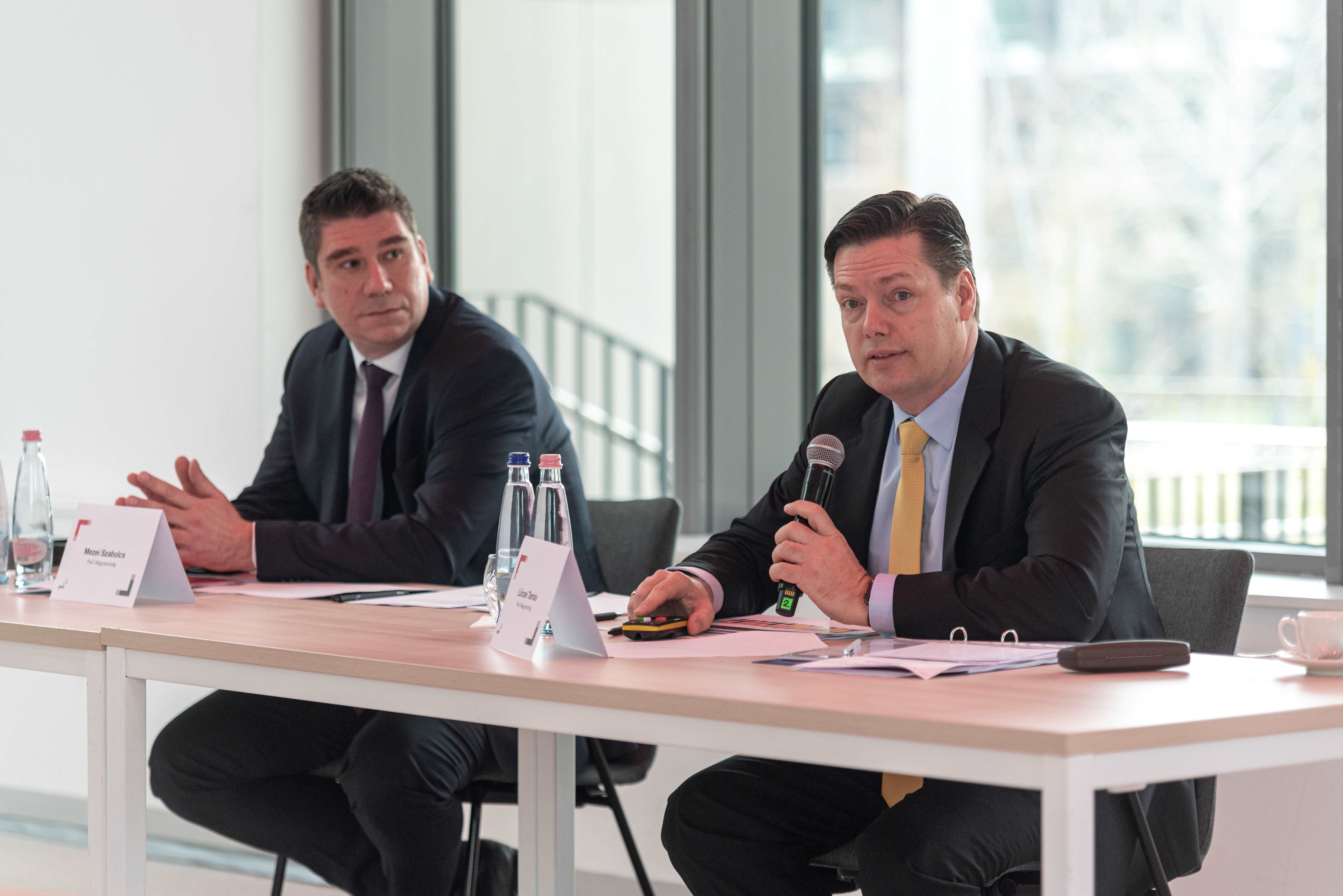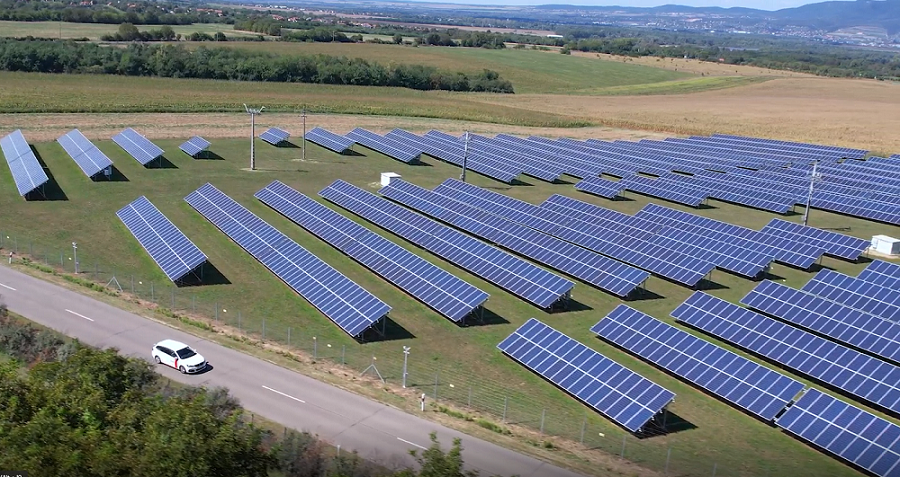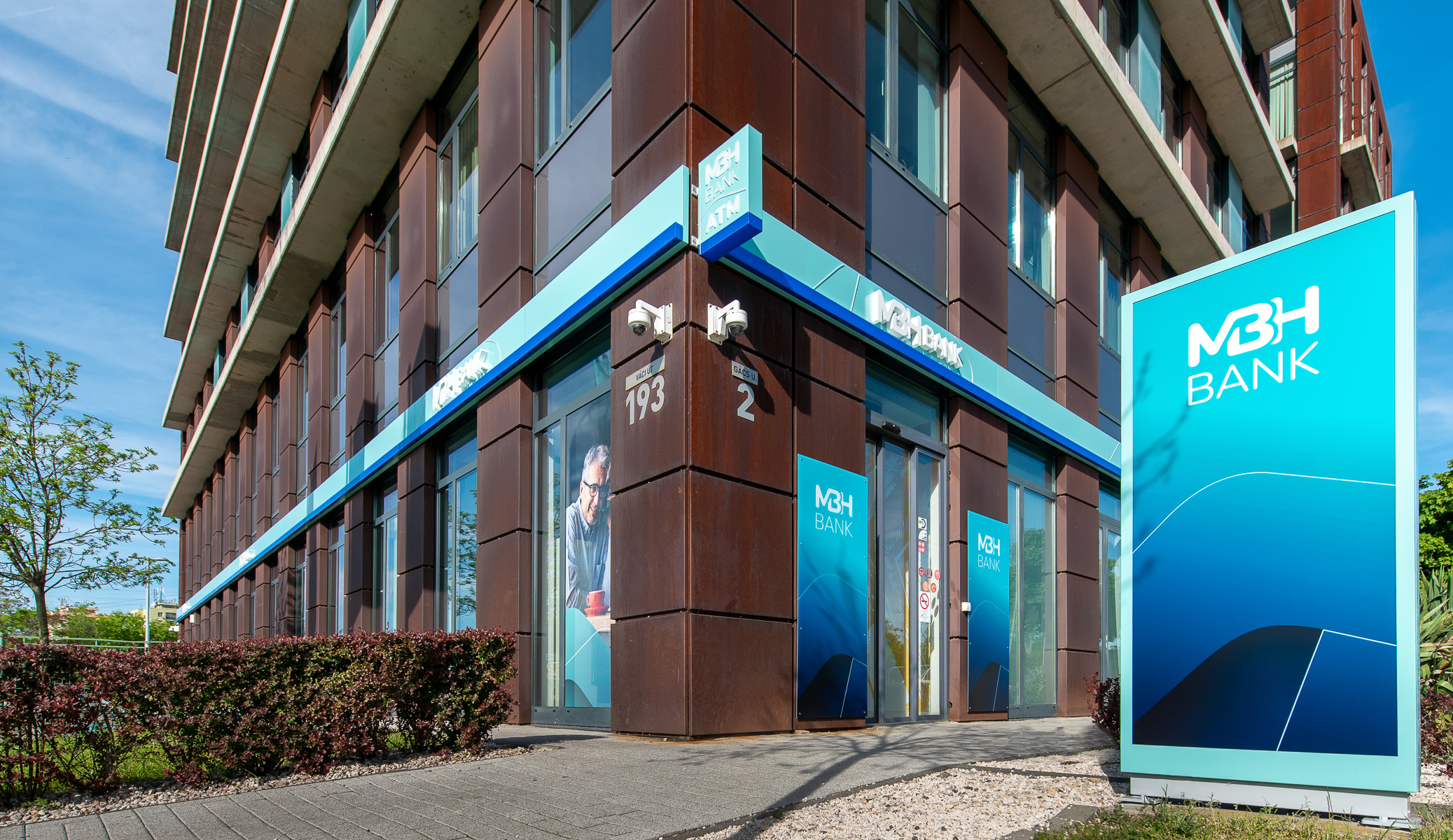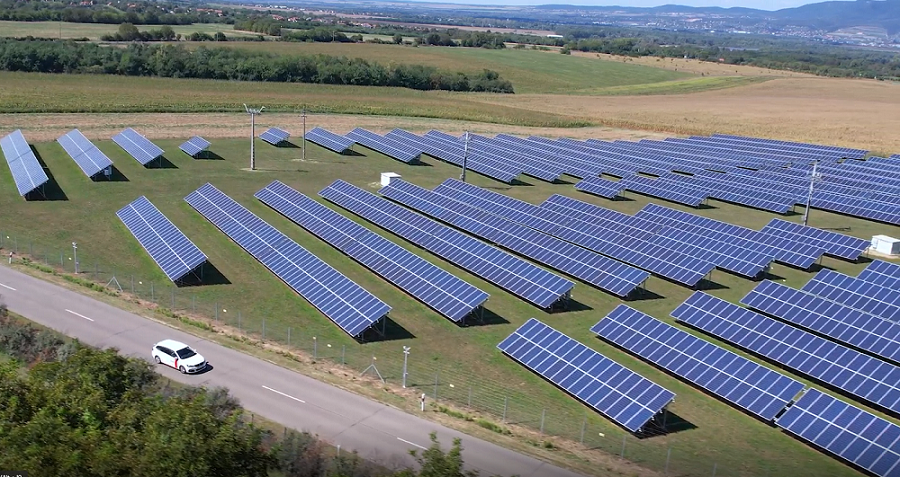PwC Says CEOs Less Concerned, Cautiously Optimistic for 2024

Tamás Lőcsei, PwC Hungary’s country managing partner (right, with microphone) and Szabolcs Mezei, a partner and government advisory leader at PwC Hungary, summarizing the results of this year’s survey at the Feb. 15 press conference.
Based on the results of its 13th annual domestic CEO Survey, consultancy PwC Hungary says confidence in both global and Hungarian economic growth seems to be returning after last year’s spike in pessimism.
According to PwC Hungary’s 13th CEO Survey, 54% of Hungarian CEOs are confident about the global economic outlook, while 60% believe Hungarian economic growth will also improve. For the first time in the survey’s history, Hungarian CEOs are more optimistic about general economic growth than their own revenue prospects. The percentage of those confident about their company’s revenue growth in 2024 has fallen to 2012 levels (47%).
More than half (58%) of CEOs say they plan to increase prices, and more than a third (36%) anticipate increasing headcount over the next 12 months. Four out of 10 believe they will need to change their companies’ business models and processes to survive in the long term. Hungarian chief executives expect an exchange rate of 394 forints to the euro, 1.7% GDP growth, and 8% inflation overall this year.
From the 297 personal interviews PwC Hungary staff conducted for this 13th annual survey, it is clear that, compared to last year (when pessimism reached one of the highest levels on record), the majority of Hungarian CEOs are now more optimistic: 54% believe the global economy will improve, and 60% expect the same for Hungarian economic growth.
On the flip side of that particular coin, 22% anticipate a decline in global and Hungarian economic growth (compared to 76% and 85%, respectively, last year).
Over the past five years, CEOs say they have improved the way their company creates, delivers and captures value by developing novel products or services (54%), adopting new technologies (44%) or developing new technologies in-house (32%), and forming new strategic partnerships (47%).
Among external threats, inflation remains the top concern for CEOs (see detailed chart of p12-13).
While two-thirds of CEOs report reallocation of resources (financial and human) between core business activities year to year, most companies have only attempted meaningful transformation in response to changes in customer preferences (55%), technological change (44%), government regulation (48%) or competitor actions (30%).
In this ecosystem, government regulation is two-faced: nearly half (48%) of CEOs say it drives change, while more than one-third (35%) say it hinders change. Other barriers inhibiting transformation include bureaucratic processes in the company (20%), lack of technological capabilities (20%), and limited financial resources (19%).
“CEOs perceive enormous inefficiencies across a range of their companies’ routine activities – such as emails, procurement, hiring, and decision-making meetings – viewing roughly 29% of the time spent on these tasks as inefficient. Performing administrative tasks as efficiently as possible is key to transformation,” Szabolcs Mezei, a partner and government advisory leader at PwC Hungary, emphasized.
Generative AI and Disrupting
Generative AI has been adopted by less than a fifth (18%) of companies, and 27% of CEOs say their company has changed its technology strategy because of generative AI. Exceptions include technology, media and entertainment, and telecommunications, where hopes and fears are also above average. See chart on pages 12-13.
Nearly three-quarters (72%) of CEOs say they are concerned about AI-related cyber risk in the short term; and even more (77%) are concerned about it over the next five years. Over half (52%) of CEOs agree that generative AI is likely to increase the spread of misinformation in the next 12 months, while 71% envisage such risk over the next five years. CEOs also expect generative AI to increase legal liabilities and reputational risks: 53% are concerned about this in the next 12 months, and 62% over the next five years.
Climate Action: Investing in Energy Efficiency
This year, fewer CEOs said they are concerned about external factors except for climate change: they show the same level of concern (13%) about its negative effects as last year. These CEOs have already started the transition to more climate-friendly operations or plan to start it in 2024, and offset the impacts of the energy crisis that are of direct concern to them and their clients. Most CEOs have undertaken to improve energy efficiency (84%); innovate new, climate-friendly products, services or technologies (64%); or develop solutions that support their clients’ climate-resilience (52%). About half (47%) of companies are upskilling their workforce, and 40% are incorporating climate risk into financial planning.
However, 13% of respondents do not consider it their responsibility to reduce their emissions; an outstanding proportion of these companies are AI champions in telecommunications and entertainment.
The two biggest impediments to decarbonization are lower hurdle rates for climate-friendly investments (45%) and regulatory complexity (44%).
CEOs’ Expanding Role
CEOs were also asked what they would like to do beyond their usual tasks and what other role they could play in the corporate structure of their company. Four-fifths of Hungarian CEOs want to pay more attention to solving their organization’s HR issues (80%), focusing primarily on organizational culture (94%), employer branding (66%), and employee retention (64%). In addition, almost four-fifths (78%) consider it important to improve their own digital skills (three-quarters say the same for their colleagues), and 62% want to be closer to making technology decisions; they would like greater involvement in organizational matters related to business development (63%) and forming strategic partnerships (56%).
About the Survey
The 13th Hungarian CEO Survey was based on PwC’s annual Global CEO Survey. The aim of the local research, conducted in parallel with the worldwide research, was to gain a more comprehensive picture of what Hungarian senior executives think, how they see the market, their expectations and what growth opportunities they have. PwC Hungary staff conducted in-person interviews with the CEOs of 297 Hungarian companies between October and December 2023, and collected quantitative data by means of questionnaires. PwC industry groups had selected companies from the following sectors: financial services; technology, media and telecommunications; consumer markets; industrial manufacturing and automotive; government and public sector; healthcare and pharma; energy and utilities; hospitality and leisure; real estate; agribusiness and food; SSC and other financial services. The results are presented in detail on PwC’s Hungarian CEO Survey website.
This article was first published in the Budapest Business Journal print issue of February 23, 2024.
SUPPORT THE BUDAPEST BUSINESS JOURNAL
Producing journalism that is worthy of the name is a costly business. For 27 years, the publishers, editors and reporters of the Budapest Business Journal have striven to bring you business news that works, information that you can trust, that is factual, accurate and presented without fear or favor.
Newspaper organizations across the globe have struggled to find a business model that allows them to continue to excel, without compromising their ability to perform. Most recently, some have experimented with the idea of involving their most important stakeholders, their readers.
We would like to offer that same opportunity to our readers. We would like to invite you to help us deliver the quality business journalism you require. Hit our Support the BBJ button and you can choose the how much and how often you send us your contributions.












